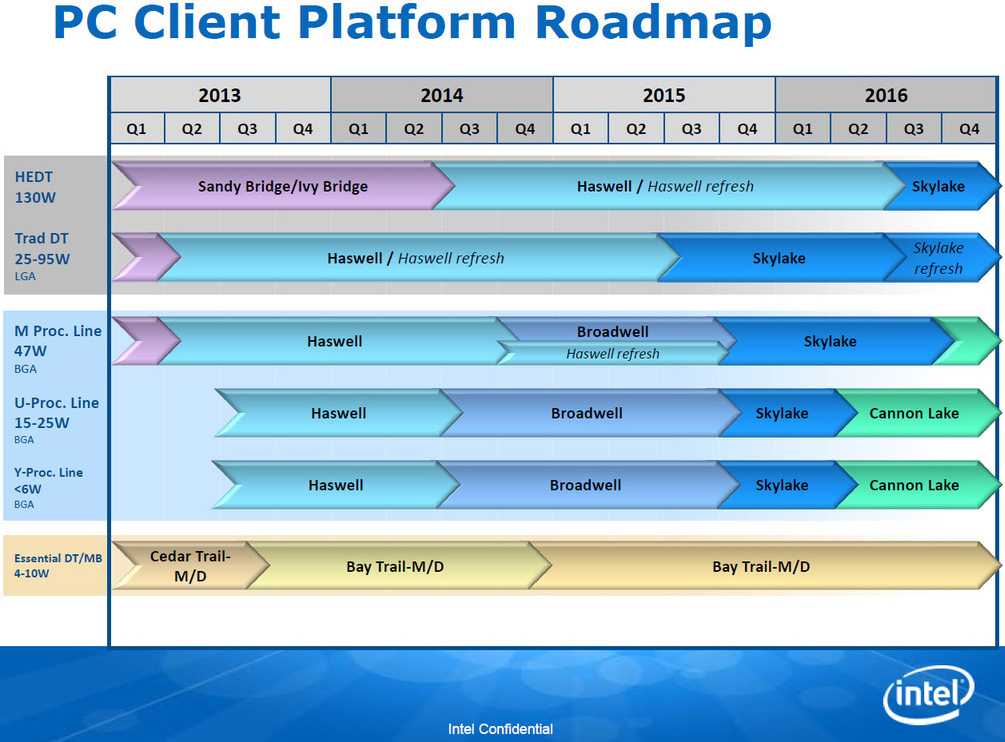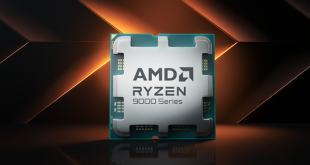Intel Corp.’s high-end desktop (HEDT) processors for enthusiasts deliver unbeatable performance, but are based on rather outdated micro-architectures compared to mainstream chips. In a bid to fix that, the world’s No. 1 maker of microprocessors for personal computers may abandon its next-generation “Broadwell-E” and bring more advanced “Skylake-E” forward.
Intel released its Core i7 “Haswell-E” microprocessors for extreme gamers and enthusiasts in September, 2014, and is expected to introduce more advanced “Broadwell-E” high-end desktop chips in the first quarter of 2016. By the time the “Broadwell-E” arrives, Intel will be offering “Skylake” processors with more advanced micro-architecture for all types of mainstream PCs and in certain cases such chips could beat more expensive HEDT offerings.
According to an alleged slide from Intel’s roadmap, which was published by Hardware.fi, the company intends to cancel release of its “Broadwell-E” in Q1 2016, but to unveil its “Skylake-E” chip in the Q3 2016. It is unclear whether the upcoming CPU will be compatible with the Intel X99 core-logic and LGA2011-3 platforms, but it is a likely scenario.
Intel’s “Skylake-E” central processing unit will be made using 14nm process technology and will feature all-new micro-architecture to deliver considerably higher performance compared to existing HEDT offerings from Intel.
Intel did not comment on the news-story.
Disclaimer: KitGuru could not verify authenticity of the slide at press time.
Discuss on our Facebook page, HERE.
KitGuru Says: In fact, it makes a great sense for Intel to cancel its “Broadwell-E” and concentrate on release of its “Skylake-E” instead. While this is theoretically possible, it should be kept in mind that all HEDT chips are based on silicon for Xeon E5 processors for servers. As a result, unless Intel cancels its upcoming “Broadwell-EP”, it can hardly cancel “Broadwell-E” and bring “Skylake-E” forward. Meanwhile, disrupting server plans is not something that Intel wants to do.
 KitGuru KitGuru.net – Tech News | Hardware News | Hardware Reviews | IOS | Mobile | Gaming | Graphics Cards
KitGuru KitGuru.net – Tech News | Hardware News | Hardware Reviews | IOS | Mobile | Gaming | Graphics Cards




Since Broadwell on the whole is generally a failure except at very low frequencies, I don’t see why this is a problem. Except for anybody who bought X99 hoping for Broadwell-E as an upgrade.
Yup, those people are gonna be *pissed* !!!
➯➯➯➯➯Freelance with Google@nw10:::
.,,
➨➨➨https://GenerousFullKaboom-work-.com/point/j0bz…
if a person bought x99 would not have upgraded to Broadwell because the performance gain would be a few (10%), there is no sense in updating each component to every series
I was waiting for Skylake-E so this is great 😀
I have a x79 with 3820 now and is working great for now, but it will be great to upgrade to a Skylake-E when it will come out 😀
A small percentage in IPS on 8 core, 16 thread chips goes a long way in multithreaded apps.
I still don’t see a need yet to.upgrade my 2011 era 2600k at 4.5. To gain what 10-15% efficiency…
They can slip them out a year from now as an ‘upgrade’ for those who got caught (they will polish it first) !
With enthusiasts waiting for the next great thing (and, apparently, some people are buying those under $400 Laptops, not remembering that FAIL a half dozen years ago) these half measure uPs won’t cut it with Skylake coming – Intel got burned by the delay.
Nobody who looks for cheap laptops is thinking straight. There’s only one or two who actually *NEED* a “throwaway” laptop ASAP and know they’re buying terrible hardware. The rest seem to be convinced that a bottom-tier, ultra-cheap-out laptop will be able to handle light gaming and whatever else they want for the next 4 years. *sigh*
I wish the market would get a brain.
I’m waiting on Skylake-E too, though I’ll be eager to see what AMD does next year. I’m on Westmere (i7 980) absolutely no need to upgrade.
As GPU’s are so good now and doing all the work for my gaming, I doubt I’ll rush to Skylake-E until the refresh. Also the RAM will change on Geforce and Radeons this year making them even more powerful and pointless to own an i7 for gaming.
in the same boat
you’d gain more than that, it’s 10-15% per generation. So going from an I7 2600K to an I7 3770K Ivy Bridge CPu would give you a ~10% increase, then going to the Haswell I7 4770K is another ~10% with the 4790K being another ~5-7% over that; then we have the Skylake I7 6700K which will be roughly 15% faster than the I7 4790K so overall going from a Sandy Bridge I7 2600K like you have to a Skylake I7 6700K you’d be gaining roughly 40% in overall power increase; which is definitely worth it even for those holding on to their good OCing Sandy Bridge chips without wanting to spend much for CPU upgrade.
Agreed, using a Rampage IV Black Edition mobo with I7 4820K Ivy Bridge-E currently, but i’m considering upgrading to X99 simply to take advantage of Broadwell-E or especially Skylake-E. Which is why i’m worried about people saying that Skylake-E may not be on X99 and Broadwell-E will be cancelled as i’d end up selling my RIVBE mobo, my I7 4820K, and my Dominator Platinum DDR3 RAM buying an X99 Sabertooth mobo, I7 5820K 6 core, and Dominator Platinum DDR4 only to find that the X179 platform is coming out with Skylake-E. This would be infuriating and stupid on intel’s part as in the past they’ve done right by their enthusiast customers by updating firmware of X79 boards to support Ivy Bridge-E CPUs even though X79 was released for Sandy-E. I’d have to shell out cash on a new CPU AND a new mobo just to use Skylake-E, which would be pointless as they aren’t likely to change the 2011 pin spread or move to DDR5 anytime soon (DDR5 would take half a decade at least)
1,1*1,1*1,057*1.15 = 1,4708155 = 47,08% gain
keep dreaming, its more like 1.05 * 1.05 * 1.03 * 1.07. if you seriously think skylake is going to be 45% better than sandybridge you are just sad. we are lucky if we can get it past 25% on all application which is extremely difficult.
I was just making a mathematical correction using the same numbers he gave.
I have no idea which are the real gains (and I don’t care, tbh).
same as you was waiting on skylake e anyways currently running i7 3930k @ 4.9ghz. The 4.9ghz is what keep me on this thing so long. Even ivy e was prob not a gain at all since it didn’t overclock as well.
depends on application… like in this list https://www.cpubenchmark.net/cpu_list.php 4960X vs 5960X is 13964 vs 16023 ~= 1.15… but yea… have been using OC qx9650 that i bought 2007, and i am still able to play most games (including GTA V). That is also the reason i do not understand people buying every second CPU gen… well at least those who buy them for entertainment.
Wow, those are some excellent news. I was hoping to have an -E CPU with a more advanced architecture than Broadwell. And just in time for my new rig!
Please, Intel, stick to this plan, PLEASE!!!
nope. there is literally zero reason to upgrade from X99/haswell E for at least 3 years. my 5930k is running at 5.1GHz 24/7. and I have 40 PCI E lanes at my disposal. I can easily do triple Sli/cross fire and still have lanes for NVMe SSDs
5.1!??? Nice!! Custom loop? That baby could last you 5+ years B|
From the last news I saw, there wont be any skylake-E.
I’m still running my 3930k @ 4.6 on air, DDR3 @ 2133. since 2012. (its been a good 3 years) and truly still nothing worth the gain for the $$$. And I believe it wont be until broadwell-E. The only thing I upgraded on my computer since 2012 is my GPU (GTX680 4gig to a GTX980-TI) And I feel like I might not even need to upgrade for a couple more years… I could just push my CPU on water to 5.0 (my vcore is pretty low for 4.6 on air so I should be good)
Skylake-E would have to require a new motherboard just because of the FIVR being removed from the CPU with skylake. The new motherboards would have to add voltage regulation
5.1GHz? Pics or it didn’t happen.
Most people can’t break 4.6GHz on water.
Said good bye to my old 2600k and welcome to my 5820k and kept a close eye on Broadwell-E. But with this cpu and dx12 i dont believe there’s anything to gain from upgrading exept in case i come across a much better overclocker or the need for 3/4-way sli, which is just a waste of money.
Considering the prices on an x99 build, i think it’s safe to say that the only real benefit you get for a much more expensive rig is 2 extra cpu cores. I was held back by my 2600k in gaming and occasionally in music production and mixing, But i should have just buildt a pc with the 4790k and dd3 instead. The bottle neck for me right now is the ASIO performance which is lacking and would be so with the 4790k aswell.
So x99 for music production and mixing? Maybe, If you got a top of the line RME audio interface, and im talking about their most expensive one since it’s there you’ll find some serious ASIO performance for even the heavy mixing projects. But like i said “Maybe”, because even then, the ASIO performance may still be the bottleneck.
skylake-e pour le dmi 3.0